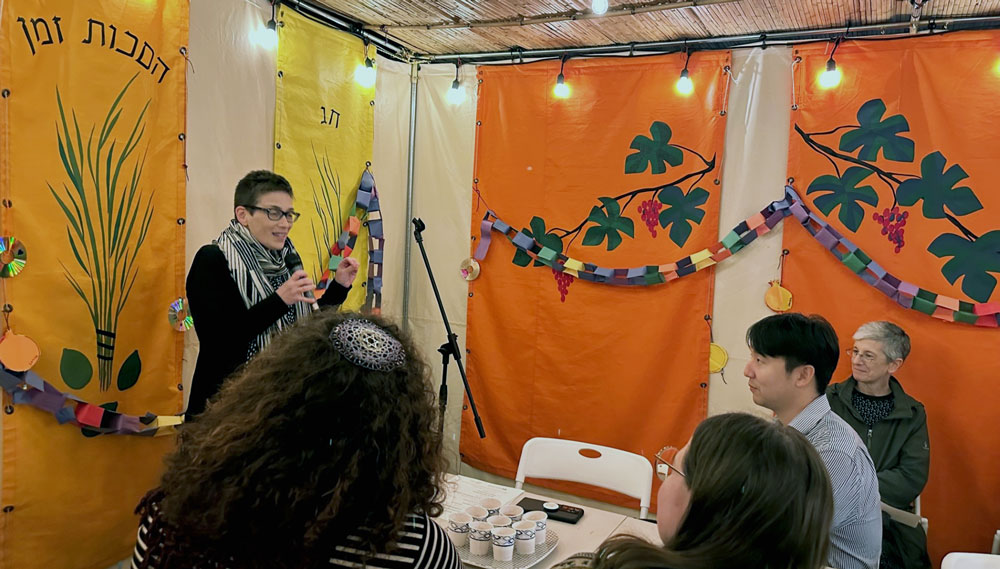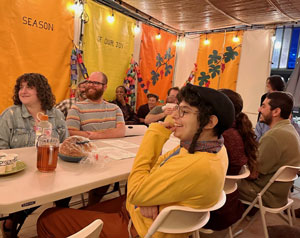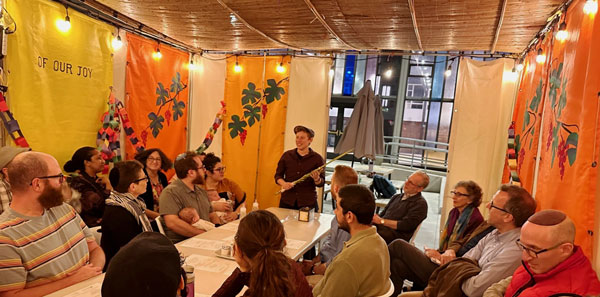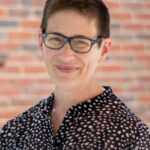Holidays An Interfaith Sukkot

On Monday evening, the Boston Theological Interreligious Consortium and the Betty Ann Greenbaum Miller Center for Interreligious Learning & Leadership of Hebrew College co-hosted Harvest & Hospitality, a community event in the Hebrew College sukkah. As part of the program, rabbinical student Naomi Gurt Lind offered the following teaching.
Jewish life is built on paradox. At weddings we break glass to acknowledge how easily shattered our lives can be; famously, we sorta make a specialty of noting the one thing that isn’t quite right; some of our happiest tunes are in minor keys.
Sukkot, more than any other holiday, is situated in paradox. Harvest—what we receive—and hospitality—what we give—are intertwined like the paper chains that decorate these traditional temporary dwellings. During Sukkot, we follow the precedent set by our common ancestor Abraham, whose tent was open to strangers, and who ran to welcome them generously with the best he had to offer. We create these fragile huts to allow the moonlight and the elements in, to share our space with guests, to embrace the wind even as it blows through us.
 The book of Kohelet (or Ecclesiastes as some of you might know it) is traditionally recited on Sukkot. Kohelet, an ancient text that feels like it could have been written by Samuel Beckett, teaches that life is complicated and unpredictable, that the good guys don’t always win, that nothing stays the same. By Kohelet’s lights, we are always in between.
The book of Kohelet (or Ecclesiastes as some of you might know it) is traditionally recited on Sukkot. Kohelet, an ancient text that feels like it could have been written by Samuel Beckett, teaches that life is complicated and unpredictable, that the good guys don’t always win, that nothing stays the same. By Kohelet’s lights, we are always in between.
Sukkot invites us and challenges us not only to live in the in-between-ness of it, but to revel in it. We acknowledge with our physical environment the fragility of our destinies. In our hastily-built booths, we celebrate what we have been given and share it with others. We remind ourselves, as the opening of chapter three of Kohelet says, that there’s a time for everything, a season for all that we find under the great big sky. But above all, Sukkot is zman simchateinu, the season of our joy. We teach ourselves over and over to find joy in the temporary.
Years ago, when he was in kindergarten, my elder son Akiva planted an etrog seed, and together as a family we have watched this seed become a proper tree, just as my spouse and I have watched our sons sprout and grow. Now you have to know: I’m terrible at plants, literally terrible. The entire history of me and plants is littered with overwatering, fallen leaves, neglect, broken stems, parched roots, withered fruit. In all of time and space, this etrog tree is the only plant I have managed not to kill.

The etrog, a symbol of Sukkot, is for our family, also a symbol of the paradox of constancy and change. Akiva is away at college now and his younger brother Gideon is caring for the tree in his absence. The paradox of Sukkot is alive and well in this tree that persists, even as time changes everything around it.
 Naomi Gurt Lind is a rabbinical student at Hebrew College and editor of the College’s Seventy Faces of Torah blog. Meet Naomi and other Rabbincal School students and faculty at our November Open Houses, Ta Sh’ma (Come & Hear) in person or online. Learn more & register here.
Naomi Gurt Lind is a rabbinical student at Hebrew College and editor of the College’s Seventy Faces of Torah blog. Meet Naomi and other Rabbincal School students and faculty at our November Open Houses, Ta Sh’ma (Come & Hear) in person or online. Learn more & register here.
Support Our Work Explore Graduate Programs Adult Learning Classes

